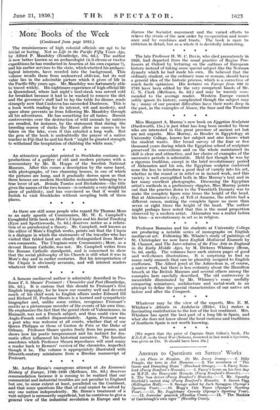A famous mediaeval author is admirably described in Pro- fessor
F. S. Shears' Froissart : Chronicler and Poet (Routledge, 10s. 6d.). It is curious that this should be Froissart's first English biography, for he knew our country well and devoted much of his chief work to English affairs under Edward III and Richard II. Professor Shears is a learned and sympathetic biographer and, unlike some critics, recognizes Froissart's merits as a picturesque recorder of the events of his own time. He emphasizes the fact that the genial cleric of Valenciennes, in Hainault, was not a French subject, and thus could view the Anglo-French conflict dispassionately. Again, Froissart was a poet who was welcome at all courts, whether that of our Queen Philippa or those of Gaston de Foix or the Duke of Orleans. Professor Shears quotes freely from his poems, and shows how his poetic temperament and his instinct for dra- matic effect influenced his historical narrative. The familiar anecdotes which Professor Shears reproduces will send many a reader back to Berners' versionnf the chronicles, imperfect though it be. The volume is appropriately illustrated with fifteenth-century miniatures from a Breslau manuscript of Froissart.








































 Previous page
Previous page